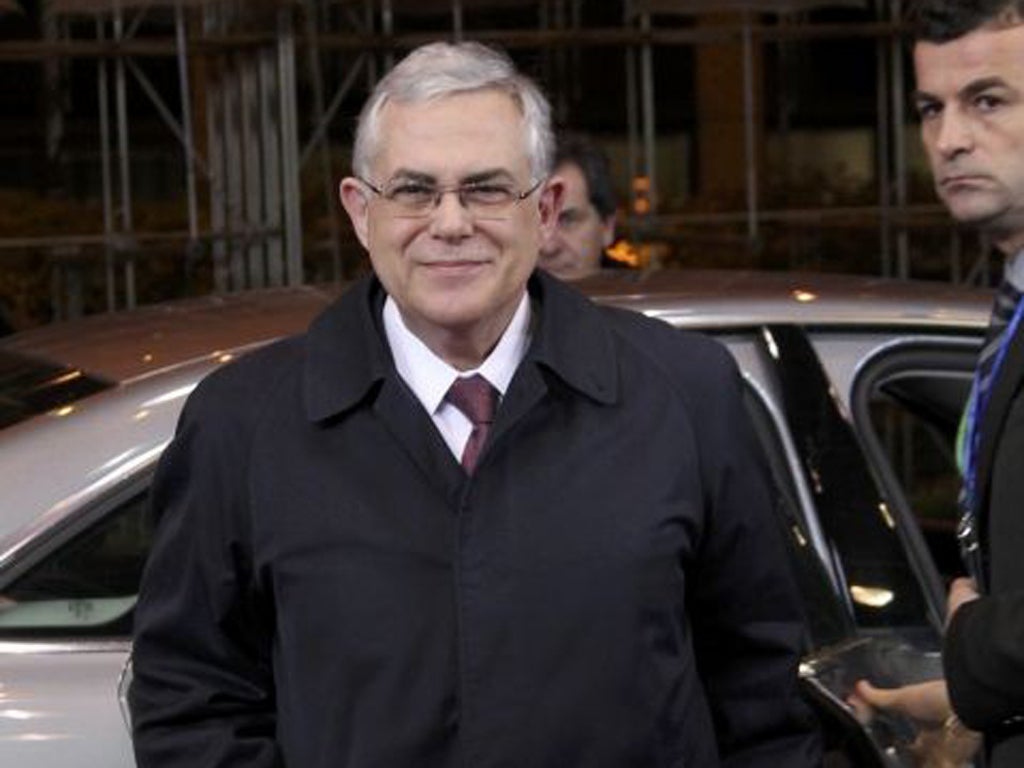
Taking negotiations to the eleventh hour, Greece has announced an agreement on new austerity cuts demanded by its international creditors to release a €130 billion (£109 billion) bailout, shortly before a crucial meeting of finance ministers in Brussels.
A statement from Prime Minister Lucas Papademos' office said talks "were successfully concluded" with representatives of the European Union, the European Central Bank and the International Monetary Fund - collectively known as the "troika".
The statement said leaders of the parties backing Papademos' coalition government had accepted the outcome of the talks with the three organisations.
"Therefore, there is a general agreement on the content of the new (bailout), ahead of tonight's meeting" of finance ministers from the 17 eurozone members in Brussels, the statement said.
A spokeswoman for Papademos' office said the deal will allow alternatives to the pension cuts rejected earlier during a marathon meeting of coalition party leaders.
Mario Draghi, the president of the European Central Bank, confirmed the latest stage in the austerity talks, telling reporters at a press conference in Frankfurt, Germany that the Greek party leaders had accepted the terms of the deal.
Although all the other cuts demanded by the troika were approved - including a 22% cut in the minimum wage, firings 15,000 of civil servants and an end to dozens of job guarantee provisions - party leaders had resisted new pension cuts worth an estimated 300 million euro (£251 million), leaving the bailout in limbo and the threat of bankruptcy high.
The deal came shortly after Greek Finance Minister Evangelos Venizelos arrived in Brussels for talks on the new bailout with his colleagues from the 17 euro countries.
"It is up to the eurogroup to decide at the highest level if the conditions are in place to proceed with the second (bailout) programme," said Amadeu Altafaj Tardio, a spokesman for the European Commission, one of the three institutions charged with negotiating the rescue conditions.
Also attending the meeting in Brussels will be Christine Lagarde, the head of the International Monetary Fund, and Draghi.
Greece needs the bailout by March 20 to redeem 14.5 billion euro (£12.1 billion) worth of bonds coming due.
A forced bankruptcy then would likely lead to the country's exit from the euro common currency, a situation that European officials have insisted is impossible because it would hurt other weak countries like Portugal, Ireland and Italy.
But financial analysts fear a chain reaction similar to the financial meltdown triggered by the collapse of investment bank Lehman Brothers in the fall of 2008.
Greece has been kept solvent since May 2010 by payments from a 110 billion euro (£92 billion) international rescue loan package. When it became clear the money would not be enough, a second bailout was decided last October.
There is considerable resistance in Greece to further austerity, after two years of vicious spending cuts that have failed to drastically improve the state finances - instead fuelling galloping unemployment and a deep recession.
Angry union leaders announced a 48-hour general strike for Friday and Saturday.
Ilias Iliopoulos, secretary-general of the ADEDY civil servant union, said the AP protest rallies will be held outside Parliament in central Athens on the two days, and on Sunday when MPs are expected to vote on the new austerity measures.
Previous anti-austerity protests have turned violent.
AP
Subscribe to Independent Premium to bookmark this article
Want to bookmark your favourite articles and stories to read or reference later? Start your Independent Premium subscription today.

Join our commenting forum
Join thought-provoking conversations, follow other Independent readers and see their replies